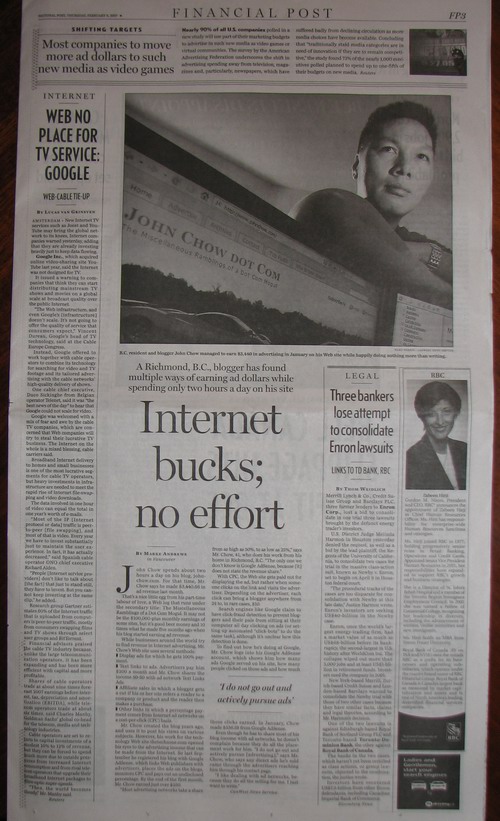∞(无穷)骑乐(yuè)
上帝不响。如歌单车......Never too late for a happy childhood (young-at-heart is so easy — pedaling a revolution from within)...
2004 (30)
2005 (484)
2006 (237)
2007 (154)
2008 (97)
2009 (85)
2010 (64)
2011 (32)
2021 (1)
2023 (1)

Internet bucks; no effort
A Richmond, B.C., blogger has found multiple ways of earning ad dollars while spending only two hours a day on his site
Marke Andrews in Vancouver, CanWest News Service
Published: Thursday, February 08, 2007John Chow spends about two hours a day on his blog, johnchow. com. For that time, Mr. Chow says he made $3,440.66 in ad revenue last month. That's a nice little egg from his part-time labour of love, a Web log that runs under the secondary title: The Miscellaneous Ramblings of a Dot Com Mogul. It may not be the $100,000-plus monthly earnings of some sites, but it's good beer money and 10 times what he made five months ago when his blog started earning ad revenue.
While businesses around the world try to find revenue in Internet advertising, Mr. Chow's Web site uses several methods:
- Display ads for which he gets 100% payment.

B.C. resident and blogger John Chow managed to earn $3,440 in advertising in January on his Web site while happily doing nothing more than writing.
Ward Perrin, CanWest News Service
- Text links to ads. Advertisers pay him $200 a month and Mr. Chow shares the income 50-50 with ad network Text Links Ads.
- Affiliate sales in which a blogger gets a cut if his or her site refers a reader to a company or product and the reader then makes a purchase.
- Other links in which a percentage payment comes from Internet ad networks on a cost-per-click (CPC) basis.
Mr. Chow created the blog years ago, and uses it to post his views on various subjects. However, his work for the technology Web site thetechzone.com opened his eyes to the advertising income that can be made from the Internet. So last September he registered his blog with Google Ad Sense, which links Web publishers with advertisers, places the ads on the blogs, monitors CPC and pays out an undisclosed percentage. By the end of the first month, Mr. Chow earned just over $350.
"Most advertising networks take a share from as high as 50%, to as low as 25%," says Mr. Chow, 41, who does his work from his home in Richmond, B.C. "The only one we don't know is Google Ad Sense, because [it] does not state the revenue share."
With CPC, the Web site gets paid not for displaying the ad, but rather when someone clicks on the link and visits the advertiser. Depending on the advertiser, each click can bring a blogger anywhere from 2? to, in rare cases, $10.
Search engines like Google claim to have click-fraud detection to prevent bloggers and their pals from sitting at their computer all day clicking on ads (or setting up automated "click-bots" to do the same task), although it's unclear how this detection is done.
To find out how he's doing at Google, Mr. Chow logs into his Google Ad Sense account, which shows him how many ads Google served on his site, how many people clicked on those ads and how much those clicks earned. In January, Chow made $536.58 from Google Ad Sense.
Even though he has to share most of his blog income with ad networks, he doesn't complain because they do all the placement work for him. "I do not go out and actively pursue [advertising]," says Mr. Chow, who says any direct ads he's sold came through the advertisers reaching him through his contact page.
"I like dealing with ad networks, because they do all the selling for me. I just want to write."
http://www.canada.com/nationalpost/financialpost/printedition/story.html?id=d70c7b0d-011f-48e5-aa0a-cebe776b4d5a




good start, and will have a good future if he could be insisted on it.
年轻时本钱。他知道他要什么。
好多年轻人不知名日是什么。得过且过。
得到的也不珍惜。
网上的年轻人应当向Mr. Chow 学习。